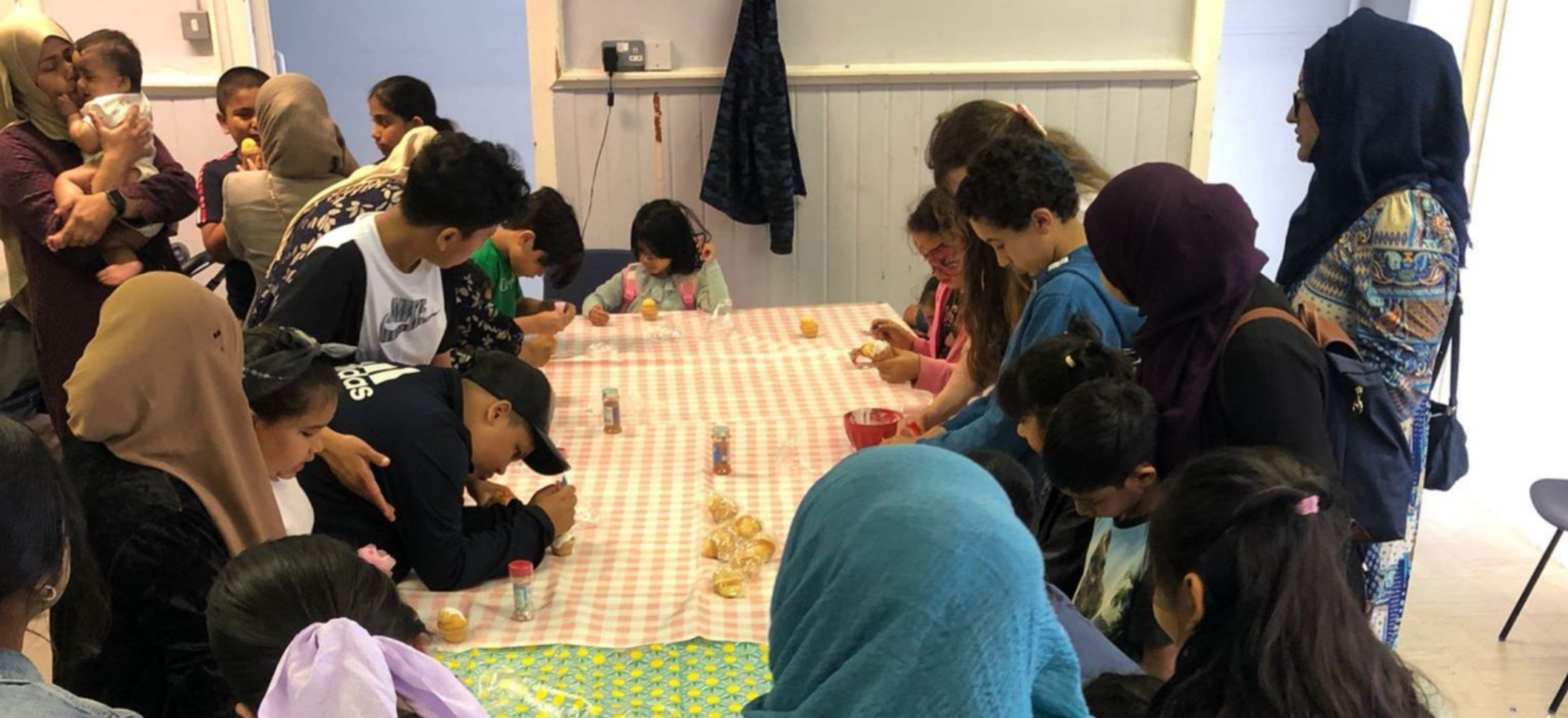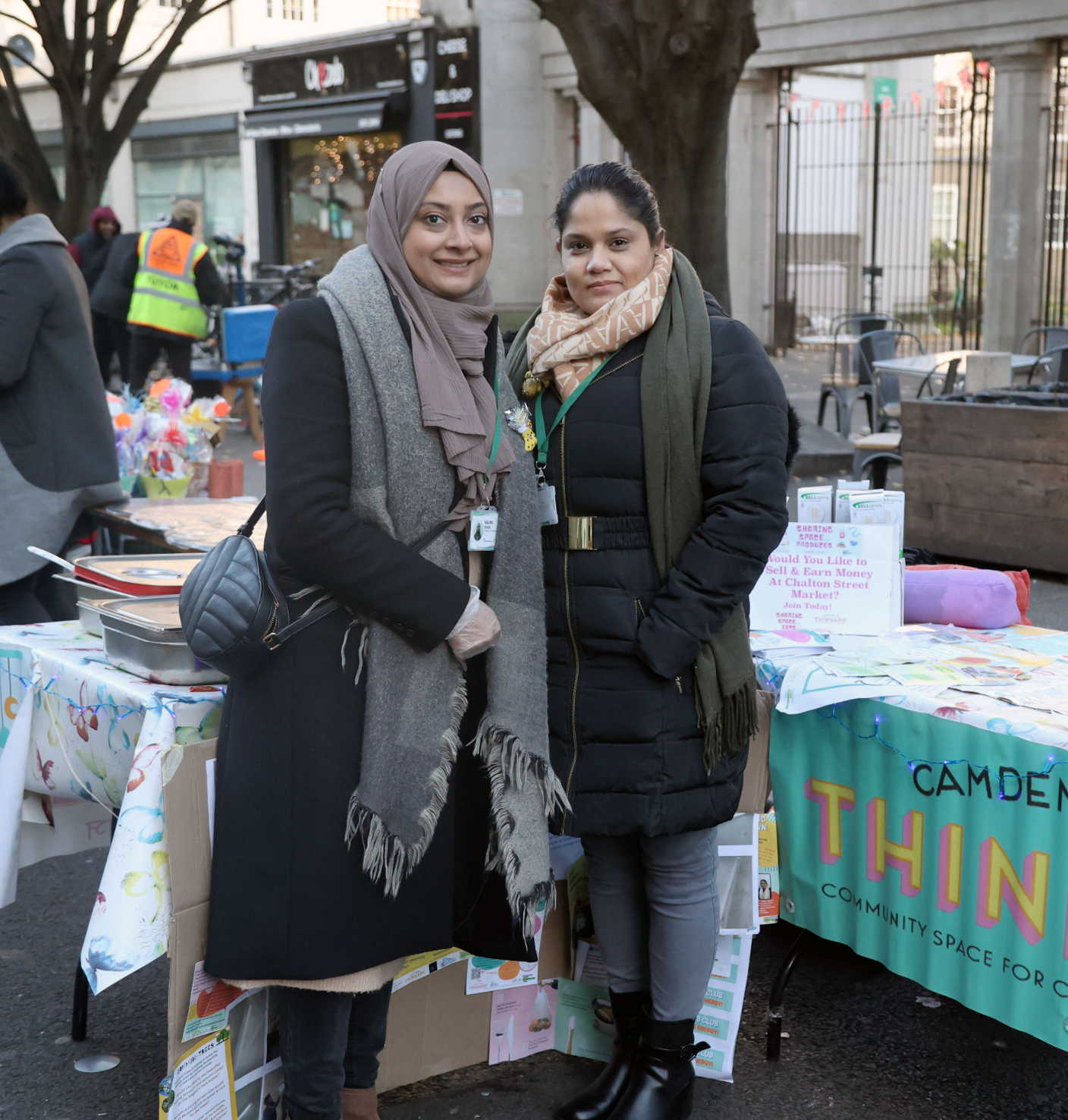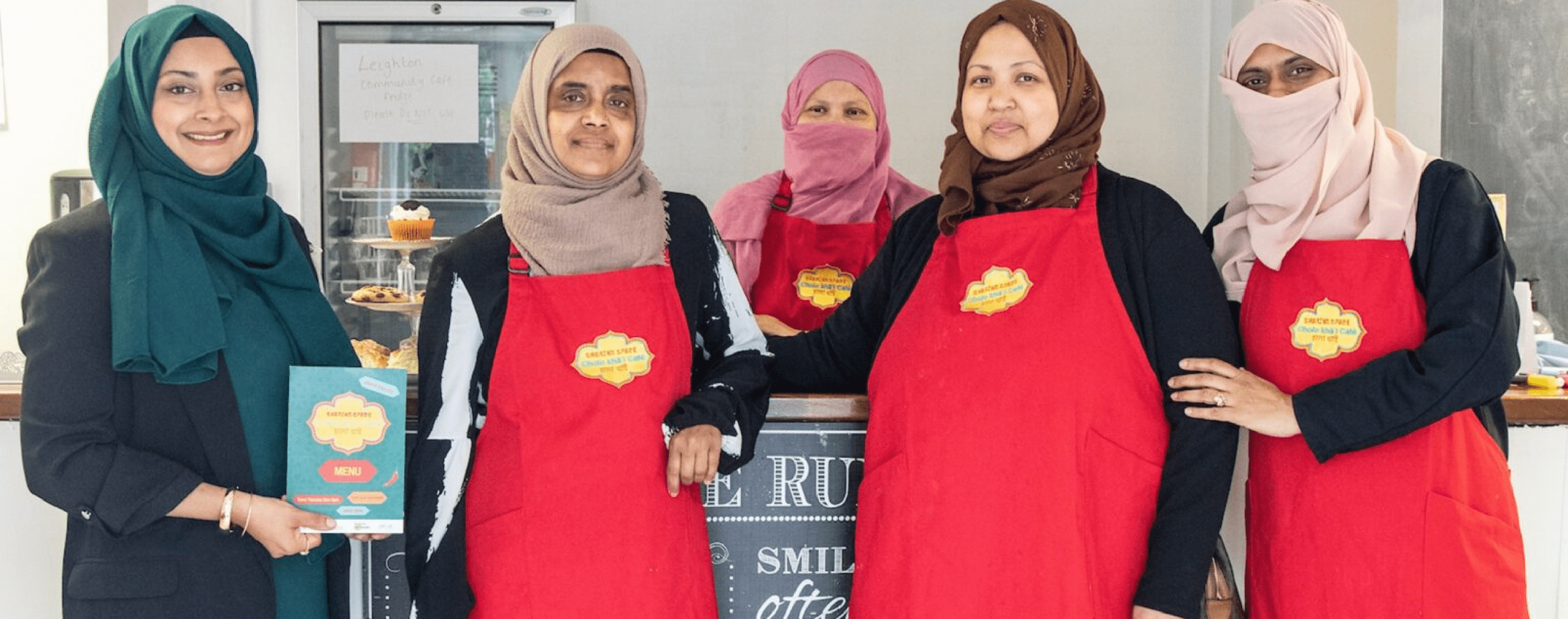The Future Neighbourhoods 2030 (FN2030) initiative is a transformative programme aimed at making London greener, healthier, and more resilient by 2030. Funded by the Mayor of London’s Green New Deal Fund, it focuses on co-designed solutions in 12 neighbourhoods.

FN2030 Partners
Circular Economy: Sharing Spaces (Somers Town)
The Future Neighbourhoods 2030 (FN2030) initiative is a transformative programme aimed at making London greener, healthier, and more resilient by 2030. Funded by the Mayor of London’s Green New Deal Fund, it focuses on co-designed solutions in 12 neighbourhoods.

An introduction to the Future Neighbourhoods 2030 programme
The Future Neighbourhoods 2030 (FN2030) initiative is a transformative programme aimed at making London greener, healthier, and more resilient by 2030. Funded by the Mayor of London’s Green New Deal Fund, it focuses on co-designed solutions in 12 neighbourhoods.
Of these projects, Somers Town in Camden and Notting Dale in Kensington and Chelsea have been selected as exemplar neighbourhoods, receiving funding to both develop strategies and to deliver a wide range of community-led, innovative and pioneering projects.
Key to the success of FN 2030 is its appreciation of the value a place-based approach to decarbonisation can have. Evidence from the programme so far shows that this place specific approach has been highly cost-effective with wide societal and economic benefits.
By promoting community ownership and co-design, FN2030 not only stimulates behavioural change but also ensures that projects are deeply rooted in local needs and aspirations. This collaborative framework is designed to be replicable, offering a blueprint for other areas to follow in creating sustainable urban environments.
The programme is a three-year initiative with a phased approach. Designed to adapt dynamically, it focuses on immediate impact and long-term planning through practical projects aligned with the Mayor’s Green New Deal themes: Retrofitting buildings; Smart energy; Circular economy; Air quality; and Greening and climate adaptation.
Project Introduction
Sharing Spaces is the flagship project from Think & Do Camden, a non-profit social action organisation that has its roots in the 2019 Camden Climate Change Assembly. The first ‘Sharing Spaces’ began in Somers Town before the Future Neighbourhoods programme, but it has expanded and grown thanks to funding from FN2030, working closely with other FN2030 and galvanising action across Somers Town.
The project involves:
- Finding and obtaining access to empty or underused spaces in Somers Town that can be used to host community hubs to support climate and social action events known as ‘Sharing Spaces’
- Engaging local residents to find out what sort of activities they’d like to see happening in their ‘Sharing Space’ and also what skills they might be able to share with others.
- Arranging regular sessions at the Sharing Space for communities to come together to have fun sharing stories, food, skills and stuff – and in so doing, tackle the climate and ecological crisis. Activities include clothing swaps, repair workshops, energy-saving sessions and workshops to reduce food waste.
As part of phases 1 and 2 of FN2030, there have been two Somers Town Sharing Spaces, located in different estates, each of which has had a regular weekly event plus themed pop-up events organised by residents.
There have also been several projects that have been developed by residents as a direct result of attending the Sharing Spaces sessions. These are delivered through Sharing Spaces as part of the FN2030 Somers Town programme. They are codesigned and run by residents, for residents.
For example:
- The Energy Savers Club, delivered in partnership with FN2030 partner Power Up North London, involves events and workshops offering tips and advice as well as free energy-saving devices.
- The Light Fantastic 2 project, which involved engaging residents to replace energy-intensive lightbulbs with low-energy LEDs
- Sharing Space Eats, a project working with local women to empower them to use their amazing cooking skills to provide catering for local organisations. The project received over 100 orders in its first year.
- Cholo Khā’i Cafe, leading on from Sharing Space Eats, a team of local Bengali women are running a cafe, one day per week. This is supported by Somers Town Community Association who have provided the cafe space and the opportunity to upskill the chefs, many of whom had not worked outside of the home before working in this café. One of the women working at the café will be undertaking an Extended Project Qualification (delivered as part of the wider FN2030 programme) to explore how best to expand the team’s capacity and organise themselves as a cooperative.
Objectives and how its tackling the Green New Deal aims
The objective of Sharing Spaces is to share skills, reduce waste, save money and get more people involved in climate action. The intention is to find out what’s important for local people and then look at linking this into climate action, rather than overtly pushing the climate message.
Sharing Spaces is primarily focused on the Green New Deal’s aim of encouraging and enabling a circular economy and has several additional objectives as well: Circular economy: there are regular Sharing Spaces events focused on fixing and swapping, for example:
- A popular fixture is a weekly ‘big swap’ of homewares, toys or clothes that residents no longer use, which they bring along to the session to exchange for something else.
- Local residents have run a number of workshops teaching people how to make and mend their own clothes, create jewellery from recycled materials, and home-made personal care products amongst others.
- Bike, clothing and electronics fixing sessions are also held with support from specialist organisations.
Cutting carbon: Reusing and sharing items reduces consumption and thus cuts carbon emissions. In addition, the Energy Savers Club and Light Fantastic Project are supporting people to reduce their energy consumption through the provision of low-cost energy efficiency items as well as advice on using energy more efficiently.
Co-benefits – Sharing Spaces delivers a multitude of co-benefits including: Social cohesion and fun
“The social element of Sharing Spaces is really strong. We design the sessions to be fun and then participants are more likely to encourage their family and friends to attend.”
Ellie Bryant, Think & Do
- A critical part of the project is paying residents to share their skills, whether that be crafting, DIY, cooking or other practical advice. In this way, passing on valuable knowledge and lived experience is properly rewarded. This also creates local employment and economic opportunity.
- Think & Do also supports residents to explore the possibility of selling what they make by linking them with the local market and events.
“We’ve taken on a local resident to run one of the Sharing Spaces. She talked about the confidence that she and some of those sharing their skills at her sessions have gained some of whom have never worked outside of the home before”
Ellie Bryant, Think & Do

Partners and their roles
Camden Council was instrumental in setting up Think & Do ahead of the FN2030 programme; it was one of the recommendations of the Camden Citizens’ Climate Assembly. Additional funding provided through Future Neighbourhoods 2030 has enabled Think & Do to build on and expand its programme for residents.
In addition to working with the council, Think & Do works in partnership with many of the other FN2030 projects in delivering Sharing Space. For example:
- Power Up North London is a core partner of the Energy Savers and Light Fantastic projects.
- Central Saint Martin’s students helped to design the labels used at the Sharing Spaces ‘give and take’ events and have also run some upcycling sessions. The Somers Town Community Association Living Centre has run practical workshops around cooking, growing food, sewing, making environmentally friendly soaps and cleaning products
- The Climate Art project, which is part of Chalton Street Market, has run workshops at the Sharing Spaces.
What impact has it had?
Those involved in delivering Sharing Spaces report seeing real progress in terms of raising awareness around climate change.
“People taking part in our workshops – whether that’s on reusing, mending or saving money – now ask for more information about climate change than before.”
Ellie Bryant, Think & Do
Two resident-led Sharing Spaces workshops have been held each week throughout the project with an average of 30-40 residents per workshop, engaging a total of around 3,000 local residents. This has involved 60 local residents being paid to share their skills at these workshops. As part of this:
- 130 sessions have been delivered for people to share and swap items.
- At least 10 participants selling products they’ve upcycled/crafted at Sharing Spaces sessions at the local market.
“Our Sharing Spaces are inclusive community hubs that bring local people together in an ever-isolated world to eat delicious food, share skills, and build inter-community solidarity”
Thalia Saber, Sharing Spaces Volunteer
Furthermore, Sharing Space Eats now works with 18 local women (who are paid, self-employed contractors) and provides catering services to various local organisations, including the Council. Orders worth £26,000 have been delivered by the enterprise, with 90% of that going directly to the local women.
What made it work
The following factors have been critical to the project’s success:
Community engagement : Working with the community to find out what is important for them is absolutely vital.
“A lot of the people in Somers Town have low-impact lives; most of them do not own a car, they walk to school, they’re not buying loads of stuff. So, our aim is to find out what matters to them and then engage them in climate action via that. This might be through learning how to mend clothes rather than throw them away. This can be a great way of starting conversations about climate.”
Ellie Bryant, Think & Do
Valuing the input of residents: Paying residents in vouchers to share their skills is an important part of the project’s success.
“Paying those who are sharing their skills demonstrates that people’s knowledge has real value and helps to grow their confidence.”
Ellie Bryant, Think & Do
Partnerships: As well as providing funding for the project, being part of the Future Neighbourhoods programme is enabling partnership working and the resolution of problems. Think & Do is currently working with another FN2030 project lead, Lifeafterhummus, to develop a strategy that will enable those involved in Sharing Space Eats to sustain the project without the need for Think & Do’s involvement.
“There are so many groups in Somers Town working on their own passions, projects and priorities, having everyone come together to collaborate and connect more on future neighbourhoods has created more partnerships in phase 3.”
Ellie Bryant, Think & Do

What Resources Where Needed
To be a success, the project required funding, a supply of bicycles, keen apprentices and willing volnteers. It also needs space and storage.
What Resources Where Needed
To be a success, the project required funding, a supply of bicycles, keen apprentices and willing volnteers. It also needs space and storage.
Funding from Future Neighbourhoods has made the continuation of this project possible. Sharing Spaces was allocated £57,000 from Phases 1 and 2 of FN2030 and has also been able to leverage funding from various other sources including the Community Infrastructure Levy.
Venues – gaining regular access to spaces has been the foundation for making this project a success.
Skills – finding residents willing to share skills is essential.
Equipment – running a Sharing Space also requires a range of equipment including access to tables and chairs, crafting materials, stationary, posters, banners and promotional materials, and sewing kits.
Food is an important feature of the Sharing Spaces, this is always vegetarian for the environmental and health benefits.
Volunteers are important in making the Sharing Spaces a success. It is important that they are given proper training, supervision and support.
Lessons Learned
Design sessions around what’s important to residents.
Pitching climate change action at an appropriate level has proved to be an important part of the project development. To successfully engage local residents, it’s vital to link practical day-to-day initiatives and money-saving tips to the need for climate change action, thus helping to embed the importance of sustainable living.
Keep it informal and make it welcoming.
The space must be designed to be welcoming and not intimidating. There should be someone on hand to welcome new participants and make sure they feel at ease.
Make it resident-led
A critical component of Sharing Spaces is having local residents share their skills rather than external ‘experts’. Initially, it proved challenging to find people willing to do this. However, over time, it became apparent that there was an abundance of skills in the local community that others could benefit from. Building trust with residents is key to encouraging their participation.
“Initially people would say they didn’t have anything to share, but it became apparent that they did have skills but lacked confidence. Paying those who are willing to share their skills for their knowledge are all valuable ways to help local people drive the work themselves”
Ellie Bryant
Further Information
Think & Do Camden along with climate action charity Ashden have produced a toolkit for other organisations interested in setting up a Sharing Spaces projects:
Other Formats and Languages
For a large print, Braille, disc, sign language video or audio-tape version of this document, please contact us at the address below:
Greater London Authority
City Hall
Kamal Chunchie Way
London E16 1ZE
Telephone 020 7983 4000
www.london.gov.uk
You will need to supply your name, your postal address and state the format and title of the publication you require.
If you would like a summary of this document in your language, please phone the number or contact us at the address above.
CopyRight
Greater London Authority
January 2025
Published by
Greater London Authority
City Hall
Kamal Chunchie Way
London E16 1ZE
enquiries 020 7983 4000
minicom 020 7983 4458
Photographs © Your Bike Project
Copies of this report are available
from www.london.gov.uk
FN2030 case study: Air quality – Your Bike Project Somers Town

Somers Town Community Association, 150 Ossulston Street London NW1 1EE
Registered Charity number: 292440
Company Limited by Guarantee 1903408
☎ 020 7388 6088
☎ 0300 102 7822
Somers Town Community Association is a Charity dedicated to providing a meaningful and positive influence at every level of people’s lives.

Somers Town Community Association, 150 Ossulston Street London NW1 1EE
Registered Charity number: 292440 Company Limited by Guarantee 1903408
☎ 020 7388 6088
☎ 0300 102 7822
Somers Town Community Association is a Charity dedicated to providing a meaningful and positive influence at every level of people’s lives.
